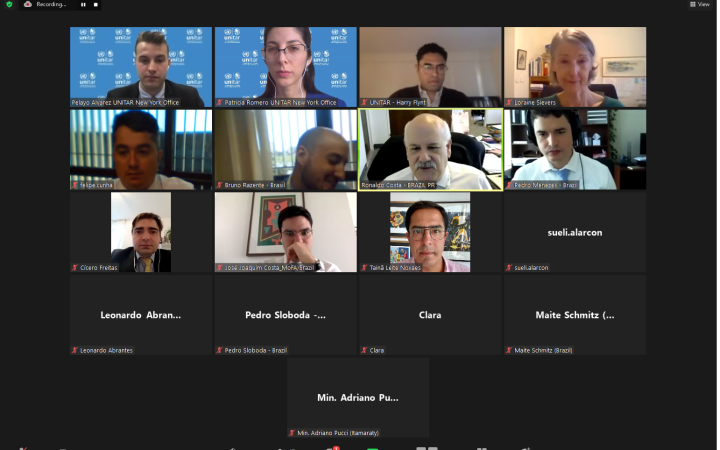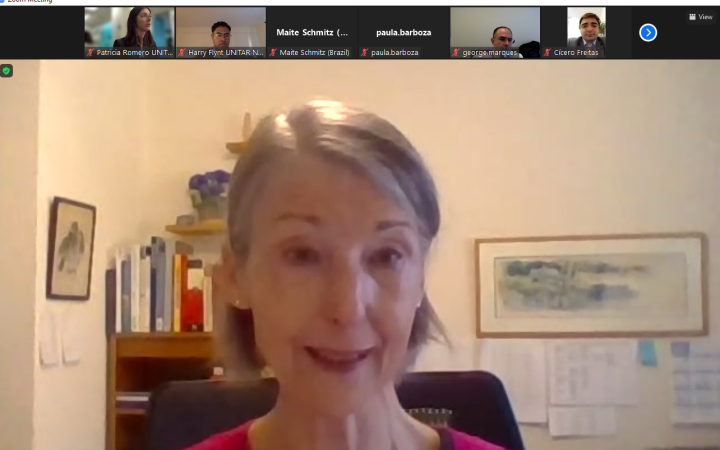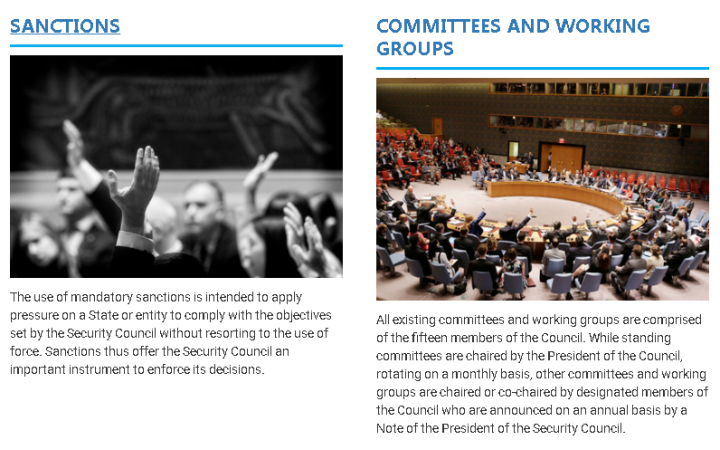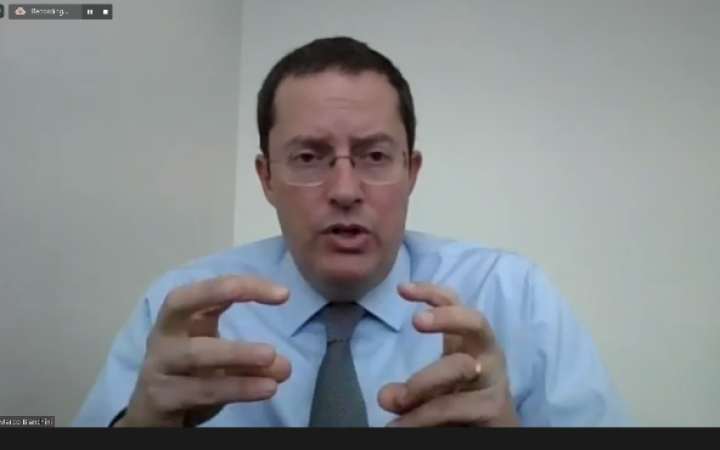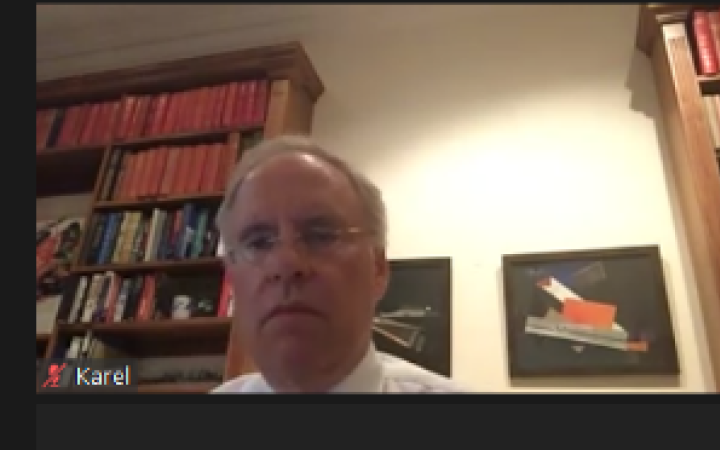8-15 November 2021, New York, USA - The UNITAR New York office organized a six day private online workshop, "Practical Preparation for Membership of the United Nations Security Council," for the Brazilian delegation of 25 diplomats to the Permanent Mission in New York and the Ministry of Foreign Affairs. With vast experience of working with the Council, Brazil secured 181 out of 190 votes cast during the election of the five non-permanent members to the Security Council (SC), and will serve a two-year term from January 2022 to December 2023. Brazil is a founding member of the United Nations and was present at the San Francisco Conference in 1945. With this new election, it will have served the Council eleven times since 1946.
H.E. Mr. Ronaldo Costa Filho, Permanent Representative of Brazil to the United Nations, took the floor to highlight the work of UNITAR. Brazilian diplomats will gain a deep understanding of general procedures, and working methods of one of the main bodies of the UN. After Ambassador Costa Filho's brief remarks, Ms. Loraine Sievers, the main facilitator of the practical element of the course, opened the main body of the workshop with an introduction to, and description of, the foundations of Council working methods.
Ms. Loraine Sievers said that it had been a privilege to work with Brazil in the past and that she was familiar with the reputation of its delegation within the Secretariat. She describes the Brazilian delegates as smart. They have a great attitude and always have new things to bring to the table. Along with Japan, Brazil is one of the Member States that has served the most times on the Security Council. They have a good understanding of Security Council procedure. The working methods of the Council can sometimes be seen as controversial within the UN system. This personalized workshop provides an opportunity to interact and develop the confidence necessary to deal with sensitive topics.
Ms. Sievers described how to handle procedures and working methods. In the context of the Security Council, it can be fascinating to learn about strategy, but at the same time, it may be difficult to understand for different reasons. There was a dialogue about the gap between the 10 elected members and P5s, which cannot be underestimated. Ms. Siemens said that the Council continues to innovate, however, most of its procedures are unwritten and Council members either learn by doing or from each other. She mentioned some of the unwritten interpretations.
Reflecting on the roles of the president and the political coordinators, Ms. Sievers talked about the compendium of presidential notes and summary statements, as well as matters in which the Council is currently involved. She shared her experiences on the pressure of elected members to leave a legacy and how hard that can sometimes be. Ms. Sievers went over previous decisions, documents created and received by Council members, and the important role of agenda item formulation, amongst other topics.
Ms. Sievers handed over to Mr. Bojan Stefanovic, Political Affairs Officer at the Security Council Practices and Charter Research Branch (SCAD) for his contribution. Reflecting on two aspects of the SC’s work, Mr. Stefanovic noted general practices and how the Council interprets the Chapter. He also emphasized that the Charter Research Branch, which is one of the branches of SCAD, has key responsibilities as they support the work of the Council members on more current matters. Those key responsibilities are related in providing advisory on SC practice. The main output they have is the Repertoire of the Practice of the Security Council plus several research products in the Security Council. They also provide support to the Informal Working Group on documentation and procedural matters.
Mr. Stefanovic reflected on Note 507 (S/2017/507) giving a general overview of the Note 507 Themes including: the role of the Presidency (to promote interactivity in consultations, communications, conduct informal consultations); Format of meetings and other SC activities; Efficiency and interactivity in meeting and consultations; Engagement with the wider membership; Cooperation within the SC (outcome documents); Engagement with regional organizations; Incoming elected members.
He guided delegates through the SC website and pointed out where to find, and how to access, the Repertoire. In addition, he directed their attention to special operations in Africa, in particular, how missions are structured, the format of meetings, and what debates are convened. A summary of the discussions themselves are contained on the same website as well as the summaries of formal meetings including links to meeting records, sub-items, participants, briefers, and outcomes.
The moderator welcomed Mr. Angel Angelov, UNITAR Facilitator and Ms. Blanca Montejo and Mr. Davey McNab, both Senior Political Affairs Officers at SCAD, to engage in a fruitful discussion on the “Security Council at the Heart of the UN System”, the “Relationship of the Security Council to the General Assembly”, and the “Subsidiary Organs of the Security Council (Sanctions)”. These interactions were well received by the Brazilian delegation, as they provided detailed information on the overall direction and the key elements of preparing for membership of the United Nations Security Council, .
One of the speakers, who was participating for the first time, Mr. Marco Bianchini, Chief of the Office of the Under-Secretary-General for Peace Operations, elaborated on the overview of peace operations. He highlighted that there had been 71 peacekeeping operations since 1948, currently there are 12. He then talked about the countries contributing uniformed personnel and total service numbers. Mr. Bianchini informed the participants that the budget approved for the period 1 July 2021 to 30 June 2022 is about 6.3 billion. This will finance 10 out of the 12 UN peacekeeping missions, including the liquidation budget for the United Nations African Union Hybrid Operation in Darfur (UNAMID), and supports logistics for other missions. The remaining two peacekeeping missions will be financed through the regular UN budget.
Mr. Bianchini underscored that the protection of civilians is an utmost priority for peace operations, as is support for transition processes, facilitating humanitarian assistance, promoting and protecting human rights, support for justice and the rule of law, and rebuilding the security sector. He stressed the importance of connecting with local communities, noting that these efforts should not take the form of a siloed approach. He also highlighted the top 10 troop and police contributing countries for each Mission.
In the final part of the programme, Mr. Eoghan McSwiney, Alternate Political Coordinator and Spokesperson at the Irish Mission to the UN, and Ambassador Karel van Oosterom, Former Permanent Representative of the Netherlands to the UN, shared their experiences of their time at the SC. They provided information on key issues of interest to the Brazilian delegation in their upcoming activities. Mr. McSwiney presented case studies on issues arising from formal and informal meetings, and looked into “Covid working methods”. He talked about the press and how the SC should respond. Other key elements discussed were language, interpretation, and the need to modernize the SC.
In conclusion, Ambassador Karel van Oosterom, took the floor. He told the Brazilian delegation to expect to become experts in Security Council rules and procedures. He talked from personal experience about how much they will grow. He talked about practical concepts such as the time the Netherlands joined the Council in 2018 and their term in presidency. He recalled formal meetings of the SC, the number of statements delivered, and the work of subsidiary organs. Ambassador van Oosterom spoke about the learning process at the start of their preparation and how more personnel were brought in from the capital. In reference to working better together, he noted that Brazil may be able to have more delegates for the Mission in New York. It is important not to underestimate the enormous amount of work involved.
Ambassador van Oosterom invited the delegation to brainstorm a few questions, such as, “Why is Brazil a member?”or “What do we want to achieve?”. He also stressed the importance of the Security Council contributing to international security as it allows them to promote their values in the global arena. He advised delegates to always have clear priorities, to structure speeches (because communication is key), and to establish clear deadlines. He noted the interconnection between the Permanent Representative, the Deputy Permanent Representative and the rest of the team, and the need to move beyond national issues. He provided examples of members focusing on specific subjects, such as the protection of journalists, or children, in conflict areas.
To wrap up the workshop, Ms. Sievers and Ambassador Marco Suazo, Head of UNITAR NYO, delivered closing remarks and expressed their gratitude for the invitation to attend this private and personalized training course, highlighting in particular the opportunity to listen to diverse views on the work of the Security Council.


